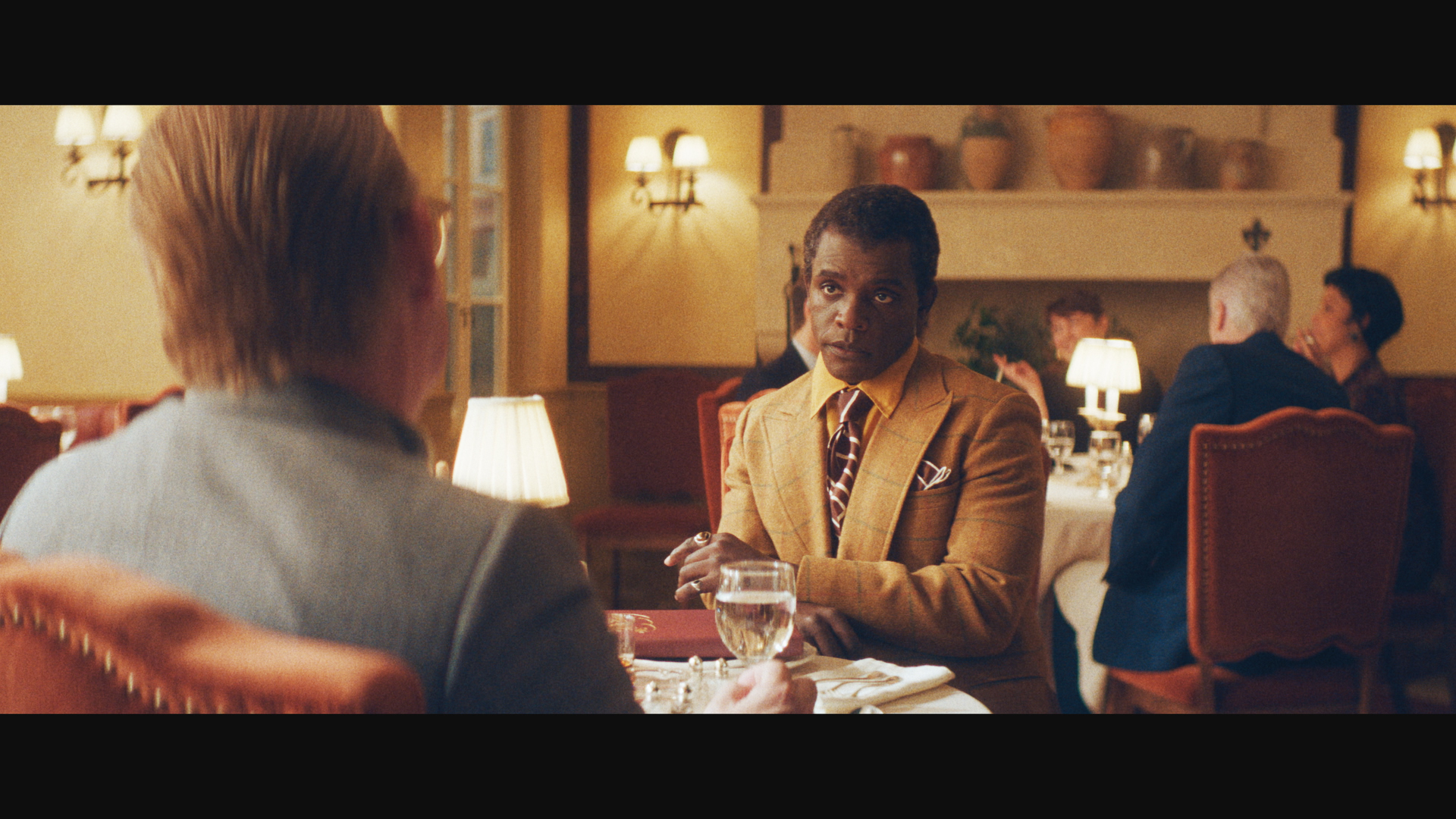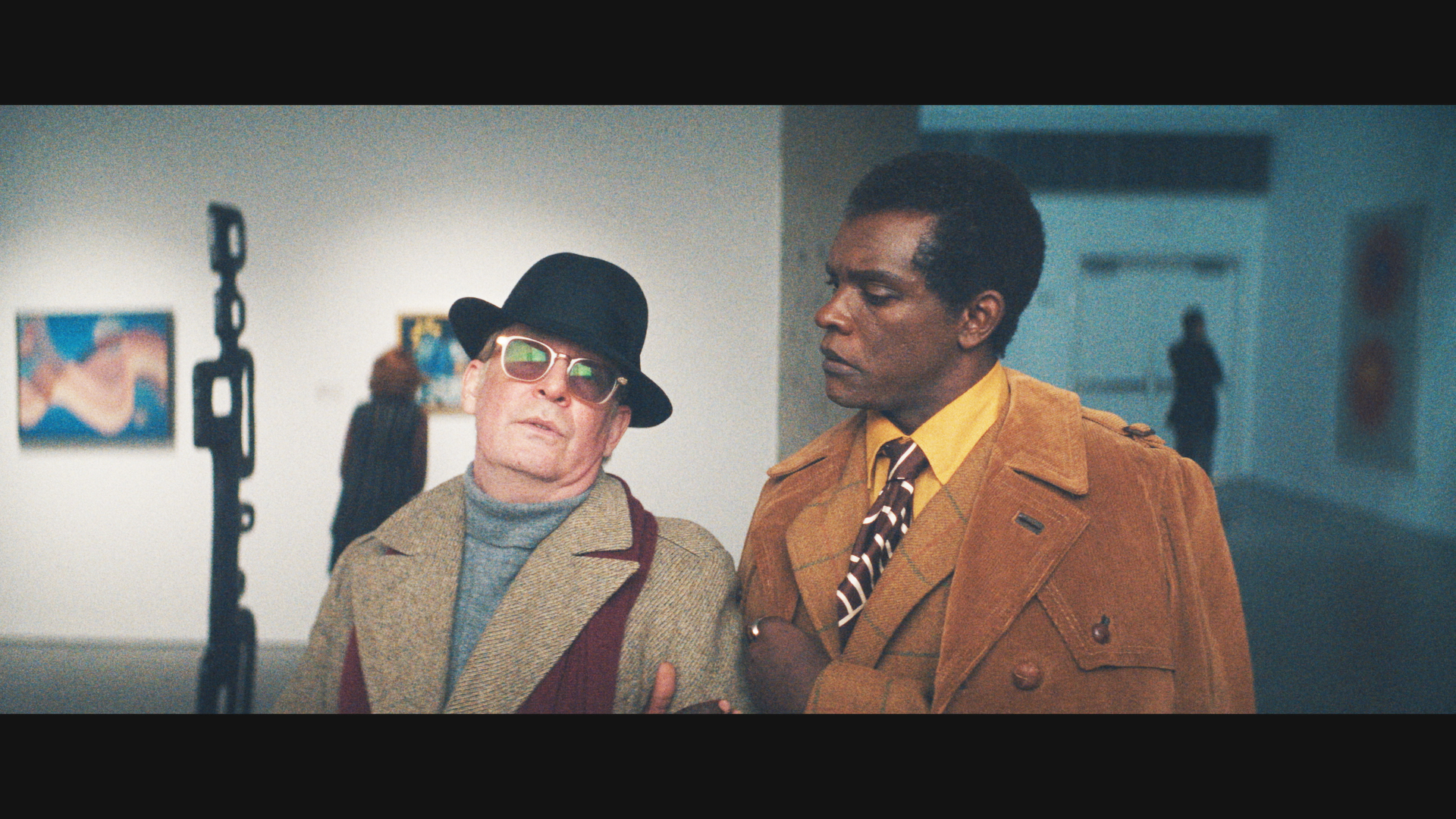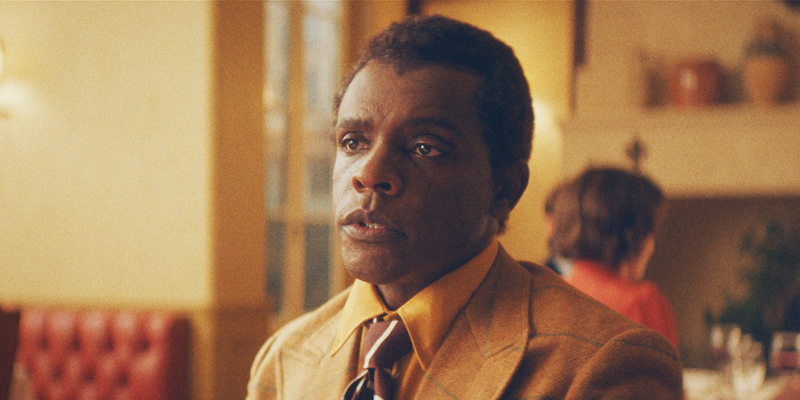“What If We Weren’t Afraid to Tell the Hard Truths?” Chris Chalk on Playing James Baldwin
“Being Baldwin requires you to be free. It’s mandatory.”
Chris Chalk may not be a household name just yet, but he’s on the cusp.
The North Carolina native burst onto the American theater scene in 2010 when he starred opposite Denzel Washington and Viola Davis in the Tony Award-winning Broadway revival of August Wilson’s Fences. Since then, you may have seen his supporting turns in 12 Years a Slave, Detroit, Justified, Homeland, The Newsroom, or Gotham. Most recently, Chalk played Paul Drake—a troubled beat cop turned private investigator in 1930s Los Angeles—opposite Matthew Rhys in HBO’s acclaimed reboot of Perry Mason.
In Capote Vs. the Swans, the second season of the Ryan Murphy’s venomous anthology series Feud, Chalk plays none other than James Baldwin, who, in 1975, pays a flying visit to his old friend Truman Capote (Tom Hollander) in the midst of the latter’s alcoholic exile from New York high society.
Chalk and I spoke over zoom about his love of Baldwin’s writing, Black- and queer-friendly creative spaces, unlearning racism, and reprising this most coveted role in the future.
*
Dan Sheehan: What drew you to this project? Were you a fan of Baldwin’s writing prior to accepting the role?
Chris Chalk: I’m a fan of not only James Baldwin’s writing, but also his way of life. I’ve been wanting to play him for as long as I can remember. I really love how free he is, and so, when given the opportunity to jump into a bit of what he is, I’ll be the first in line every time. It was an easy yes, this role.
DS: You only appear in one episode of Capote vs. the Swans [Episode 5: “The Secret Inner Lives of Swans”], but the entire installment is a showcase for Baldwin. He’s like a comet that blazes through Capote’s sky for a single night. What were some of the challenges you faced in preparing for a role like this—one which had such an intense spotlight but which you also knew would be contained within a bottle episode?
CC: I think the opportunities outweighed the challenges. I come from theater, so it gave me a chance to really dig into character work again. I got to work with their amazing movement coach and vocal coach. This is what I do. This is what I grew up learning to do. There was a little bit of polishing off that rust, but also just jumping right in and feeling that sense of this is what collaboration is. This is what TV could be. The challenges were internal. It was just the nerves of wanting to honor this guy.
After I read the words, Jon [Robin Baitz]’s words, I thought, “well, the words are wonderful, so this is gonna be on me!” [laughs] I really wanted to do my best work. I don’t care how it’s perceived, but I really wanted to pull out of me every possibility, every freedom, every bit of essence of James Baldwin. Not only did this bottle episode give me the opportunity to do that, but the support of my friends and the support of this Fued team throughout the process was phenomenal.
DS: Since his death in 1984, Capote has been played by at least seven different actors in film and TV productions. Baldwin—another acclaimed writer and prominent public figure of the same era—was a brilliant, troubled, charismatic individual who led a fascinating life, yet we have rarely, if ever, seen him depicted on screen (in fact, Jeffrey Wright’s amalgamation of Baldwin and A.J. Liebling in The French Dispatch is the only one I can remember). Why do you think that is?
CC: I think he’s just one of those guys that, until you’re ready to do it with honor, you don’t do it. I mean, who’s gonna do it? I think I’m incredible, I’m the best in the world, sure, but it’s a daunting thing to take on such a massive character, a massive entity, a person whose affectations and point of view we are so aware of. Someone has to be willing to be vulnerable enough, and talented enough, to write that story in the way that would execute him with honor.
I don’t think it’s a bad thing that he hasn’t been exploited as much, because, though it is not the most Black-friendly or queer-friendly world, we are in a Black-friendly and queer-friendly place that we weren’t in ten years ago. There are more voices, and there’s more talent being honored in those spaces, so we are now in a place where we can see Baldwin shine. What a great time to see him. I think we might also need to revisit a lot of what he wrote, because much of it is painfully accurate for this time.

DS: It’s interesting that you say that because, in past weeks and months, I’ve noticed two Baldwin quotes being shared over and over again on social media as the civilian death toll, and child death toll, in Gaza has risen and risen:
The first is from a 1980 Nation essay: “The children are always ours, every single one of them, all over the globe; and I am beginning to suspect that whoever is incapable of recognizing this may be incapable of morality.”
The second is from a 1963 interview: “I’m terrified at the moral apathy, the death of the heart, which is happening in my country. These people have deluded themselves for so long that they really don’t think I’m human. And I base this on their conduct, not on what they say. And this means that they have become in themselves moral monsters.”
It feels like people are crying out for a figure like Baldwin right now—someone of fearsome intellect, eloquence, and moral courage. When you look around at American public life today, do you see an inheritor to James Baldwin, someone who can speak this kind of truth to power?
CC: I think there are people doing it, but the question is, who is going to publicize it? The machine is a big machine now; it’s a very, very large machine, and there are a lot of stopgaps along the way. Another question might be: would James Baldwin have as prominent a voice today? I don’t know. Capitalism is super strong, dude! His voice is a voice that demands change, his voice is one that demands consideration of other perspectives.
I think there are humans out there… but who is as intellectual? That becomes the better question. Who could do it? I think it’s going to take a lot of us to fill those shoes. But I think it is happening. It’s like saying “oh, music isn’t the same.” Well, yeah, it is, it’s just not popular now. It challenges too much of the norm, and so it gets stuffed down. But there are people who are carrying his torch, who are honoring him. I think we, in entertainment, could use a little bit more intellectual discussion. I think we could use a little less ice cream and few more savory treats, for the lack of a better analogy.
DS: Do you think that the industry is closing ranks within that safer “ice cream” space, or do you feel free to speak your mind, and to approach parts that require courage?
CC: I think it continues to take a great deal of courage to be one’s authentic self in the face of such a critical society … I came up very poor in a very racist place, so I did a lot of assimilation. I went to a primarily white institute, so there was not a lot of blackness discussed, and consequently I wasn’t really embracing my full self. As I meet the James Baldwins and the Malcolm Xs of the world, in their texts and in videos, I feel that I, Chris Chalk, continue to become freer and freer and freer, and my team supports that, but that’s who I am. If I was twenty years old now, holy shit, I’d be so afraid to be free.
As much embracing of that freedom there is, there’s just as many people saying you suck, you’re the worst, you’re a bum. But my life objective is to (hopefully, by the time it’s all done) be my most authentic self, and have my art come out through that vessel. I can look back at the old me and see myself sitting on impulses and not really embracing freedom. That’s the beauty of this character and this role and this company—it was quite the opposite of that. Being James Baldwin requires you to be free. It’s mandatory. I can’t be guarded. I can’t be self-conscious.
DS: That freedom and that electricity really shine through in the performance. There’s a wonderful moment early on in your episode, when Baldwin is sitting across from Capote, who is mired in the problems of this elite social world. Baldwin reminds him that he, just like all the “swans,” is racist, and that it’s about what he does with that knowledge and how he chooses to respond to it.
CC: One thing that’s so important to remember is: everybody is racist. I believe it, too. How can you be a part of a racist society and not be racist? I had to unlearn racism, and if a Black dude has to unlearn racism, then everybody should reveal their little racist check sheet and just see what habits are birthed from awful things.

DS: It occurred to me, after seeing your performance, that I would happily watch a six- or eight-episode miniseries focused entirely on Baldwin’s life. Would you consider reprising the role? Has anyone floated the idea?
CC: Not only would I consider it, I plan to continue to play James Baldwin as much as is humanly possible, for anyone, because there’s so much to say, so much to learn from him, so much to demystify. I think there’s power in just presenting a human as they are so that we can all go, “oh, there’s a James Baldwin in me. It’s ok that I haven’t shown it so far. I might be seventy years old, but there’s still a James Baldwin in me, there’s still a chance to change someone’s point of view if I can cause that ripple.”
Which is what he did just by existing. He didn’t have to talk, but the way he chose to attempt to help change minds—what a great use of his energy. If we could do one tenth of what he did, wouldn’t we be a better society? What if we weren’t afraid to tell the truths—the hard, scary truths that might piss a lot of people off? We might be as honorable as he.
DS: Do you have a favorite work of Baldwin’s? Is there one you return to more than others?
CC: I’m a Go Tell It on the Mountain person and a Fire Next Time person. [Chalk’s wife calls out “Beale Street” from offscreen] Oh, of course, Beale Street! Baldwin was just so prolific, and each of his works has a piece that still matters, a piece that still speaks to the little shy Chris who didn’t want to talk, and to the adult Chris who is still learning to use this instrument to help people.
DS: Your next project is Welcome to Derry, a prequel to Stephen King’s It. Can you tell us a little bit about that?
CC: Man, you know I can’t tell you anything, of course not! What can I tell you… I can tell you that Feud was one of the most satisfying things I’ve ever done, because I’ve always wanted to play Baldwin, but I felt like what I’ve taken from Feud and moved into Derry is the freedom and the willingness to express tough emotions and tough predicaments with honor. There are issues of race and issues of Blackness in this show that I feel the writers have honored to the best of the tone of this show’s ability. Other than that, man, you know I can’t tell you anything; they’ll shoot me on sight!
________________________
FEUD: Capote Vs. The Swans, Episode 5: “The Secret Inner Lives of Swans” airs tonight at 10 p.m. ET on FX




















